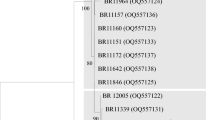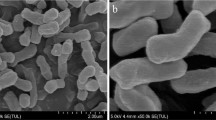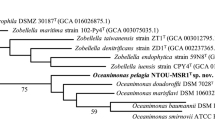Abstract
A strictly anaerobic sulfate-reducing strain, designated SG60T, was isolated from paddy soil collected in Fujian Province, China. Growth of strain SG60T was observed at 20–37 °C, pH 5.5–10.0 and 0–0.7% (w/v) NaCl. Strain SG60T showed the highest 16S rRNA sequence similarities to the type strains of Fundidesulfovibrio magnetotacticus FSS-1T (97.2%) and Fundidesulfovibrio putealis DSM 16056T (96.4%). Phylogenetic trees based on the16S rRNA sequence and genome-based phylogenomic tree constructed using 120 core genes showed that strain SG60T clustered with members of the genus Fundidesulfovibrio. The average nucleotide identity (ANI) and digital DNA-DNA hybridization (dDDH) values between strain SG60T and the most closely related type strain F. magnetotacticus were 78.2% and 21.6%, respectively. Strain SG60T contained MK-7 as the main respiratory quinone and anteiso-C15:0, anteiso-C17:1 ω9c, iso-C16:0 and iso-C16:1 H as the major fatty acids. Strain SG60T produced desulfoviridin and possessed genes (nifHDK) encoding functions involved in nitrogen fixation. The genomic DNA G + C content was 65.5%. Based on the observed physiological properties, chemotaxonomic characteristics and ANI and dDDH values, strain SG60T represents a novel species of the genus Fundidesulfovibrio, for which the name Fundidesulfovibrio soli sp. nov. is proposed. The type strain is SG60T (= GDMCC 1.3310T = JCM 35676T).


Similar content being viewed by others
Data availability
The GenBank accession numbers of strain SG60T are OM850369 (16S rRNA gene) and JAKZKW000000000 (genome), respectively. Other datasets generated and analyzed during the current study are available from the corresponding author on reasonable request.
Abbreviations
- dDDH:
-
Digital DNA–DNA hybridization
- ANI:
-
Average nucleotide identity
- DMSO:
-
Dimethyl sulfoxide
References
Basso O, Caumette P, Magot M (2005) Desulfovibrio putealis sp. nov., a novel sulfate-reducing bacterium isolated from a deep subsurface aquifer. Int J Syst Evol Microbiol 55:101–104. https://doi.org/10.1099/ijs.0.63303-0
Besemer J, Lomsadze A, Borodovsky M (2001) GeneMarkS: a self-training method for prediction of gene starts in microbial genomes. Implications for finding sequence motifs in regulatory regions. Nucl Acids Res 29:2607–2618. https://doi.org/10.1093/nar/29.12.2607
Bick JA, Dennis JJ, Zylstra GJ, Nowack J, Leustek T (2000) Identification of a new class of 5’-adenylylsulfate (APS) reductases from sulfate-assimilating bacteria. J Bacteriol 182:135–142. https://doi.org/10.1128/JB.182.1.135-142.2000
Chiang YL, Hsieh YC, Fang JY, Liu EH, Huang YC (2009) Crystal structure of Adenylylsulfate reductase from Desulfovibrio gigas suggests a potential self-regulation mechanism involving the C terminus of the beta-subunit. J Bacteriol 191:7597–7608. https://doi.org/10.1128/JB.00583-09
Collins MD, Pirouz T, Goodfellow M, Minnikin DE (1977) Distribution of menaquinones in actinomycetes and corynebacteria. J Gen Microbiol 100:221–230. https://doi.org/10.1099/00221287-100-2-221
Dalsgaard T, Bak F (1994) Nitrate reduction in a sulfate-reducing bacterium, Desulfovibrio desulfuricans, isolated from rice paddy soil: sulfide inhibition, kinetics, and regulation. Appl Environ Microbiol 60:291–297. https://doi.org/10.1128/aem.60.1.291-297.1994
Dong ZY, Narsing Rao MP, Wang HF, Fang BZ, Liu YH et al (2019) Transcriptomic analysis of two endophytes involved in enhancing salt stress ability of Arabidopsis thaliana. Sci Total Environ 686:107–117. https://doi.org/10.1016/j.scitotenv.2019.05.483
Dos Santos PC, Fang Z, Mason SW, Setubal JC, Dixon R (2012) Distribution of nitrogen fixation and nitrogenase–like sequences amongst microbial genomes. BMC Genom 13:162. https://doi.org/10.1186/1471-2164-13-162
Edwards J, Johnson C, Santos-Medellín C, Lurie E, Podishetty NK et al (2015) Structure, variation, and assembly of the root-associated microbiomes of rice. Proc Natl Acad Sci USA 112:E911–E920. https://doi.org/10.1073/pnas.1414592112
Einsle O, Messerschmidt A, Stach P, Bourenkov GP, Bartunik HD et al (1999) Structure of cytochrome c nitrite reductase. Nature 400:476–480. https://doi.org/10.1038/22802
Felsenstein J (1981) Evolutionary trees from DNA sequences: a maximum likelihood approach. J Mol Evol 17:368–376. https://doi.org/10.1007/BF01734359
Felsenstein J (1985) Confidence limits on phylogenies: an approach using the bootstrap. Evolution 39:783–791. https://doi.org/10.1111/j.1558-5646.1985.tb00420.x
Fitch WM (1971) Toward defining the course of evolution: minimum change for a specific tree topology. Syst Zool 20:406–416. https://doi.org/10.1093/sysbio/20.4.406
Galushko A, Kuever J (2020) Fundidesulfovibrio. In: Trujillo ME, Dedysh S, de Vos P, Hedlund B, Kämpfer P, Rainey FA, Whitman WB (eds) Bergey’s manual of systematics of archaea and bacteria. Wiley, Hoboken
Goris J, Konstantinidis KT, Klappenbach JA, Coenye T, Vandamme P et al (2007) DNA–DNA hybridization values and their relationship to whole-genome sequence similarities. Int J Syst Evol Microbiol 57:81–91. https://doi.org/10.1099/ijs.0.64483-0
Hofer U (2018) Environmental microbiology: new diversity in the sulfur cycle. Nat Rev Microbiol 16:261. https://doi.org/10.1038/nrmicro.2018.32
Hu A, Ye J, Ren G, Qi Y, Chen Y (2022) Metal-free semiconductor-based bio-nano hybrids for sustainable CO2-to-CH4 conversion with high quantum yield. Angew Chem Int Ed Engl 61:e202206508. https://doi.org/10.1002/anie.202206508
Kanehisa M, Goto S, Hattori M, Aoki-Kinoshita KF, Itoh M et al (2006) From genomics to chemical genomics: new developments in KEGG. Nucl Acids Res 34:D354–D357. https://doi.org/10.1093/nar/gkj102
Kanehisa M, Goto S, Kawashima S, Okuno Y, Hattori M (2004) The KEGG resource for deciphering the genome. Nucl Acids Res 32:D277–D280. https://doi.org/10.1093/nar/gkh063
Kim M, Oh HS, Park SC, Chun J (2014) Towards a taxonomic coherence between average nucleotide identity and 16S rRNA gene sequence similarity for species demarcation of prokaryotes. Int J Syst Evol Microbiol 64:346–351. https://doi.org/10.1099/ijs.0.059774-0
Kimura M (1980) A simple method for estimating evolutionary rates of base substitutions through comparative studies of nucleotide sequences. J Mol Evol 16:111–120. https://doi.org/10.1007/BF01731581
Kovacs N (1956) Identification of Pseudomonas pyocyanea by the oxidase reaction. Nature 178:703–704. https://doi.org/10.1038/178703a0
Kroppenstedt RM (1982) Separation of bacterial menaquinones by HPLC using reverse phase (RP18) and a silver loaded Ion exchanger as stationary phases. J Liq Chromatogr 5:2359–2367. https://doi.org/10.1080/01483918208067640
Lagesen K, Hallin P, Rødland EA (2007) RNAmmer: consistent and rapid annotation of ribosomal RNA genes. Nucl Acids Res 35:3100–3108. https://doi.org/10.1093/nar/gkm160
Liu GH, Yang S, Tang R, Xie CJ, Zhou SG (2022) Genome analysis and description of three novel diazotrophs Geomonas species isolated from paddy soils. Front Microbiol 12:801462. https://doi.org/10.3389/fmicb.2021.801462
Lowe TM, Eddy SR (1997) tRNAscan-SE: a program for improved detection of transfer RNA genes in genomic sequence. Nucl Acids Res 25:0955–0964. https://doi.org/10.1093/nar/25.5.955
Meier-Kolthoff JP, Carbasse JS, Peinado-Olarte RL, Göker M (2022) TYGS and LPSN: a database tandem for fast and reliable genome–based classification and nomenclature of prokaryotes. Nucleic Acids Res 50:D801–D807. https://doi.org/10.1093/nar/gkab902
Nakajima A, Aono T, Tsukada S, Siarot L, Ogawa T et al (2012) Lon protease of Azorhizobium caulinodans ORS571 is required for suppression of reb gene expression. Appl Environ Microbiol 78:6251–6261. https://doi.org/10.1128/AEM.01039-12
Narsing Rao MP, Dong ZY, Kan Y, Dong L, Li S et al (2020) Description of Paenibacillus tepidiphilus sp. nov., isolated from a tepid spring. Int J Syst Evol Microbiol 70:1977–1981. https://doi.org/10.1099/ijsem.0.004004
Ostrowski J, Wu JY, Rueger DC, Miller BE, Siegel LM (1989) Characterization of the cysJIH regions of Salmonella typhimurium and Escherichia coli B: Dna sequences of cysI and cysH and a model for the siroheme-Fe4S4 active center of sulfite reductase hemoprotein based on amino acid homology with spinach nitrite reductase. J Biol Chem 264:15726–15737. https://doi.org/10.1016/S0021-9258(19)84893-7
Pandey CB, Kumar U, Kaviraj M, Minick KJ, Mishra AK (2020) DNRA: A short-circuit in biological N-cycling to conserve nitrogen in terrestrial ecosystems. Sci Total Environ 738:139710. https://doi.org/10.1016/j.scitotenv.2020.139710
Parks DH, Chu Dos Ochina M, Waite DW, Rinke C, Skarshewski A et al (2018) A standardized bacterial taxonomy based on genome phylogeny substantially revises the tree of life. Nat Biotechnol 36:996–1004. https://doi.org/10.1038/nbt.4229
Parks DH, Imelfort M, Skennerton CT, Hugenholtz P, Tyson GW (2015) CheckM: assessing the quality of microbial genomes recovered from isolates, single cells, and metagenomes. Genom Res 25:1043–1055. https://doi.org/10.1101/gr.186072.114
Parte AC, Sardà Carbasse J, Meier-Kolthoff JP, Reimer LC, Göker M (2020) List of prokaryotic names with standing in nomenclature (LPSN) moves to the DSMZ. Int J Syst Evol Microbiol 70:5607–5612. https://doi.org/10.1099/ijsem.0.004332
Pfennig N, Widdel F, Trüper HG (1981) The dissimilatory sulfate-reducing bacteria. In: Starr MP, Stolp H, Trüper HG, Balows A, Schlegel HG (eds) The prokaryotes, vol 1. Springer, Berlin, pp 926–940
Pinto R, Tang QX, Britton WJ, Leyh TS, Triccas JA (2004) The Mycobacterium tuberculosis cysD and cysNC genes form a stress-induced operon that encodes a tri-functional sulfate-activating complex. Microbiology 150:1681–1686. https://doi.org/10.1099/mic.0.26894-0
Postgate J (1959) A diagnostic reaction of Desulphovibrio desulphuricans. Nature 183:481–482. https://doi.org/10.1038/183481b0
Postgate JR (1972) Chapter XIII The acetylene reduction test for nitrogen fixation. Methods microbiology. Elsevier, Amsterdam, pp 343–356
Pott AS, Dahl C (1998) Sirohaem sulfite reductase and other proteins encoded by genes at the dsr locus of Chromatium vinosum are involved in the oxidation of intracellular sulfur. Microbiology 144:1881–1894. https://doi.org/10.1099/00221287-144-7-1881
Price MN, Dehal PS, Arkin AP (2010) FastTree 2–approximately maximum-likelihood trees for large alignments. PLoS ONE 5:e9490. https://doi.org/10.1371/journal.pone.0009490
Richter M, Rosselló-Móra R (2009) Shifting the genomic gold standard for the prokaryotic species definition. Proc Natl Acad Sci USA 106:19126–19131. https://doi.org/10.1073/pnas.0906412106
Roerdink D (2020) Redrawing the early sulfur cycle. Nat Geosci 13:526–527
Saitou N, Nei M (1987) The neighbor–joining method: a new method for reconstructing phylogenetic trees. Mol Biol Evol 4:406–425. https://doi.org/10.1093/oxfordjournals.molbev.a040454
Sasser M (1990) Identification of bacteria by gas chromatography of cellular fatty acids. MIDI technical note 101. Microbial ID, Inc, Newark
Shimoshige H, Kobayashi H, Shimamura S, Miyazaki M, Maekawa T (2022) Fundidesulfovibrio magnetotacticus sp. Nov., a sulphate-reducing magnetotactic bacterium, isolated from sediments and freshwater of a pond. Int J Syst Evol Microbiol. https://doi.org/10.1099/ijsem.0.005516
Simon J, Gross R, Einsle O, Kroneck PM, Kröger A et al (2000) A NapC/NirT-type cytochrome c (NrfH) is the mediator between the quinone pool and the cytochrome c nitrite reductase of Wolinella succinogenes. Mol Microbiol 35:686–696. https://doi.org/10.1046/j.1365-2958.2000.01742.x
Suzuki D, Ueki A, Shizuku T, Ohtaki Y, Ueki K (2010) Desulfovibrio butyratiphilus sp. nov., a gram–negative, butyrate–oxidizing, sulfate–reducing bacterium isolated from an anaerobic municipal sewage sludge digester. Int J Syst Evol Microbiol 60:595–602. https://doi.org/10.1099/ijs.0.013771-0
Tamura K, Stecher G, Kumar S (2021) MEGA11: molecular evolutionary genetics analysis version 11. Mol Biol Evol 38:3022–3027. https://doi.org/10.1093/molbev/msab120
Waite DW, Chuvochina M, Pelikan C, Parks DH, Yilmaz P et al (2020) Proposal to reclassify the proteobacterial classes Deltaproteobacteria and Oligoflexia, and the phylum Thermodesulfobacteria into four phyla reflecting major functional capabilities. Int J Syst Evol Microbiol 70:5972–6016. https://doi.org/10.1099/ijsem.0.004213
Widdel F, Pfennig N (1981) Studies on dissimilatory sulfate–reducing bacteria that decompose fatty acids. I. Isolation of new sulfate–reducing bacteria enriched with acetate from saline environments. Description of Desulfobacter postgatei gen. nov., sp. nov. Arch Microbiol 129:395–400. https://doi.org/10.1007/BF00406470
Yarza P, Yilmaz P, Pruesse E, Glöckner FO, Ludwig W et al (2014) Uniting the classification of cultured and uncultured bacteria and archaea using 16S rRNA gene sequences. Nat Rev Microbiol 12:635–645. https://doi.org/10.1038/nrmicro3330
Yoon SH, Ha SM, Kwon S, Lim J, Kim Y et al (2017a) Introducing EzBioCloud: a taxonomically united database of 16S rRNA gene sequences and whole–genome assemblies. Int J Syst Evol Microbiol 67:1613–1617. https://doi.org/10.1099/ijsem.0.001755
Yoon SH, Ha SM, Lim JM, Kwon SJ, Chun J (2017b) A large–scale evaluation of algorithms to calculate average nucleotide identity. Antonie Van Leeuwenhoek 110:1281–1286. https://doi.org/10.1007/s10482-017-0844-4
Acknowledgements
We thank Prof. Aharon Oren for his kindly help and advice on nomenclature.
Funding
This work was supported by National Natural Science Foundation of China (grant no: 42277257 and U21A20295) and the National Science Fund for Excellent Young Scholars of China (grant no: 42222703).
Author information
Authors and Affiliations
Contributions
SGZ and GHL designed the outline. SY drafted the manuscript. SY, RT and CJX performed isolation, deposition and identifications. SY and SH performed the genome analysis. SGZ, CR and GHL revised the manuscript.
Corresponding authors
Ethics declarations
Conflict of interest
The authors declare that there are no conflicts of interest.
Ethical approval
This study does not contain any studies with human participants or animals performed by any of the authors.
Additional information
Communicated by Erko Stackebrandt.
Publisher's Note
Springer Nature remains neutral with regard to jurisdictional claims in published maps and institutional affiliations.
Supplementary Information
Below is the link to the electronic supplementary material.
Rights and permissions
Springer Nature or its licensor (e.g. a society or other partner) holds exclusive rights to this article under a publishing agreement with the author(s) or other rightsholder(s); author self-archiving of the accepted manuscript version of this article is solely governed by the terms of such publishing agreement and applicable law.
About this article
Cite this article
Yang, S., Tang, R., Xie, CJ. et al. A novel sulfate-reducing and nitrogen-fixing bacterium Fundidesulfovibrio soli sp. nov., isolated from paddy soils. Arch Microbiol 205, 80 (2023). https://doi.org/10.1007/s00203-023-03412-3
Received:
Accepted:
Published:
DOI: https://doi.org/10.1007/s00203-023-03412-3




